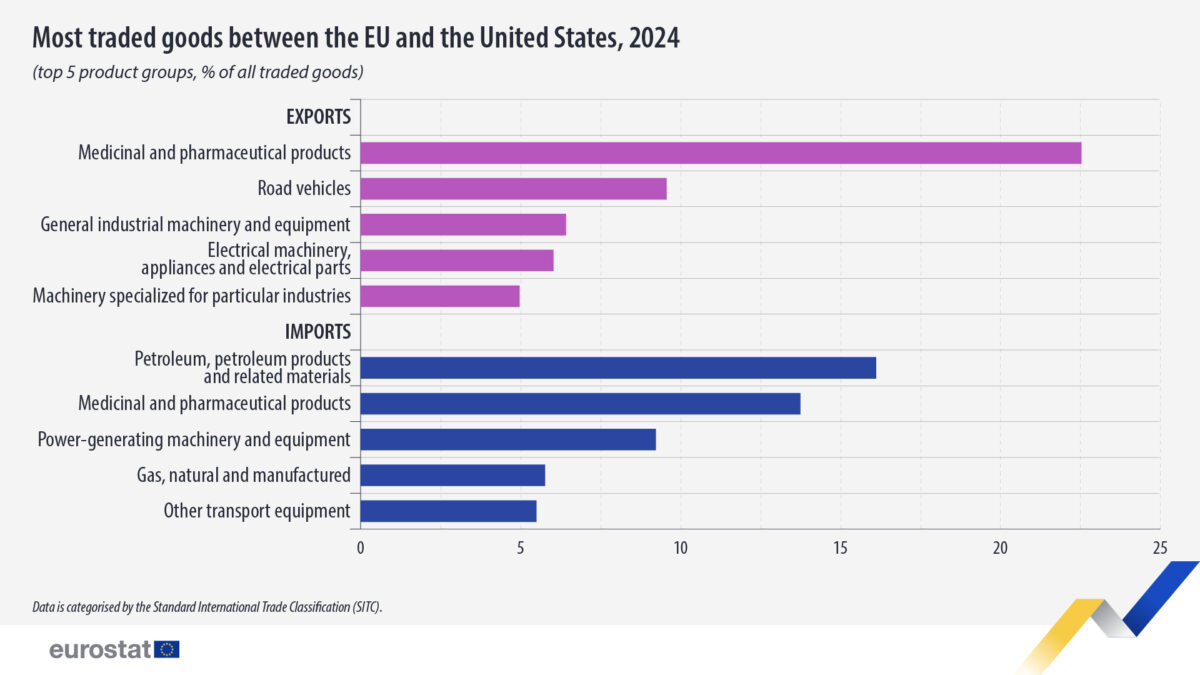Donald Trump has lit the fire of a tariff war. Just this week, he announced a new 30 per cent tariff on EU goods to come into effect as of 1st August, just as a pause on his so-called 20 per cent “reciprocal tariffs” nears its end this month. As we brace for a potential new tariff, MaltaCEOs.mt asks international trade expert, Wolfgang Tweraser what we can expect.
“I lived in the United States for over 27 years, and I am convinced that these tariffs will ultimately create more difficulties for the United States than for the European Union,” Mr Tweraser, CEO and President of TW Consulting & Trade Ltd says.
Mr Trump is dishing out a blitz of new tariffs to its trading partners, as part of his promise in his 2024 presidential campaign to “revive the US economy” that he claims has been ripped off by other countries under the Democratic Party.
But while the US government may collect some additional revenue through these tariffs, the broader economic consequences will “likely be detrimental”, according to Mr Tweraser.
“The broader economic consequences will likely be detrimental, placing an undue burden on businesses and ordinary citizens alike – outcomes that, unfortunately, do not seem to be a genuine priority for policymakers in Washington.”
However, a lack of coherency in the EU bloc prevents it from being protected to a better degree.
“Had the European Union functioned as a truly cohesive and unified bloc, the impact of these tariffs on our economy could have been significantly mitigated. Regrettably, Europe still lacks genuine unity, and effective negotiation remains an area where EU political leaders consistently fall short.”
Most exposed industries
For the trading CEO, the sectors that will feel the pinch with Mr Trump’s looming tariffs are naturally the EU’s biggest exports to the US: automotive, machinery and equipment, luxury goods and agrifood products.
When looking into the breakdown according to the Standard International Trade Classification (SITC) divisions, the top five most exported divisions in 2024 made up half (49.5 per cent) of all exports to the United States. These were medicinal and pharmaceutical products (22.5 per cent), road vehicles (9.6 per cent), general industrial machinery and equipment (6.4 per cent), electrical machinery, appliances and electrical parts (6.0 per cent) and machinery specialised for particular industries (5.0 per cent).

Cars and parts are major EU exports, make up 9.6 per cent of all exports to the United States – from Germany, France, and Italy especially.
“Even a small drop in automotive exports here has big economic knock-on effects,” he says.
Machinery and industrial equipment:
Machine and Industrial Equipment is another major exporter to the US. An industry of high-value goods with thin margins, a 30 per cent tariff “can kill competitiveness overnight”, Mr Tweraser warns.
“For luxury goods – fashion, jewellery, wine, spirits – these can absorb some premium pricing, but a sudden 30 per cent spike might shift demand to local or non-EU brands. Equally, agrifood products like cheese, wine, olive oil, specialty meats are key EU exports with strong brand identity, but vulnerable to substitution if prices surge,” he says.
“Lastly, one of the EU biggest exports to the US, pharmaceuticals, will be hit hard, unless certain exceptions for essential products exist.”
Malta’s exposure
Malta as an industrial base is small but trade-dependent, according to Mr Tweraser, and its niche as a Mediterranean trade intermediary isn’t immune to disruptions.
“Malta’s role as a transshipment and reexport hub means any drop in EU goods flows could hit port throughput and logistics revenue directly.”
“Look at our limited but high-value manufacturing: pharma, microelectronics, aircraft maintenance. These sectors are small but exposed if tariffs escalate. Even niche exporters face margin squeezes or demand shocks.”
On consumer imports
“Consumer imports are another pressure point. If EU-sourced goods become more expensive, retailers and households must absorb the pain – especially if non-EU alternatives undercut local prices.”
On tourism
“Tourism is less of a direct risk, but don’t ignore second-order effects. If tariffs dent EU disposable income or confidence, outbound travel demand could waver. Malta’s luxury stays and services aren’t bulletproof.”
The market vs tariffs
“Equities always move first. Autos, luxury stocks, industrials – they’ve seen pre-emptive selling. Logistics firms and port operators? Volatility ahead if EU goods flows slow. This isn’t just about tariffs; it’s about supply chain recalibration.
The euro might wobble on growth fears, but agri-tariffs could spark bigger fireworks. Protected EU delicacies like wines, cheeses, Parma ham could see price spikes if trade walls go up.
Scope matters. Are medical supplies or critical components exempt? Duration: is this a short-term bluff or a permanent shift? And retaliation: if the EU targets US tech or agriculture, the ripple effects multiply. Finally, can exporters absorb costs through margins or clever hedging? That’s the buffer.
“The bottom line is that for the EU, automakers, high-value manufacturers, and agrifood exporters are top of the list for pain. For Malta, a direct hit is smaller due to its size, but niche industries like pharmaceuticals and re-exports could feel ripple effects,” he says.
Lastly, for markets, equity prices in relevant sectors usually adjust ahead of implementation, so any new diplomatic developments could swing sentiment quickly. Still, the EU is yet to know if the tariff will really come into play with Mr Trump’s volatile foreign policies.
BOV CEO: ‘Empowering professionals key to strengthening Malta’s financial services sector’
Kenneth Farrugia said investing in professional development is central to reinforcing Malta’s financial services ecosystem and long-term competitiveness.
Vladimiro Comodini steps down from RSM Malta
He will continue to helps boards and businesses navigate governance, transformation and strategic challenges.
€60 million bond set to ‘accelerate investment pipeline’ – Hili Finance Chairman Geoffrey Camilleri
'The bond will enable the group to pursue strategic opportunities in real estate and hospitality development.'
‘Your past doesn’t disqualify you’: Growth Gurus Founder opens up on quitting drugs
His real wake-up call was the realisation that he was being horrible to his family.









